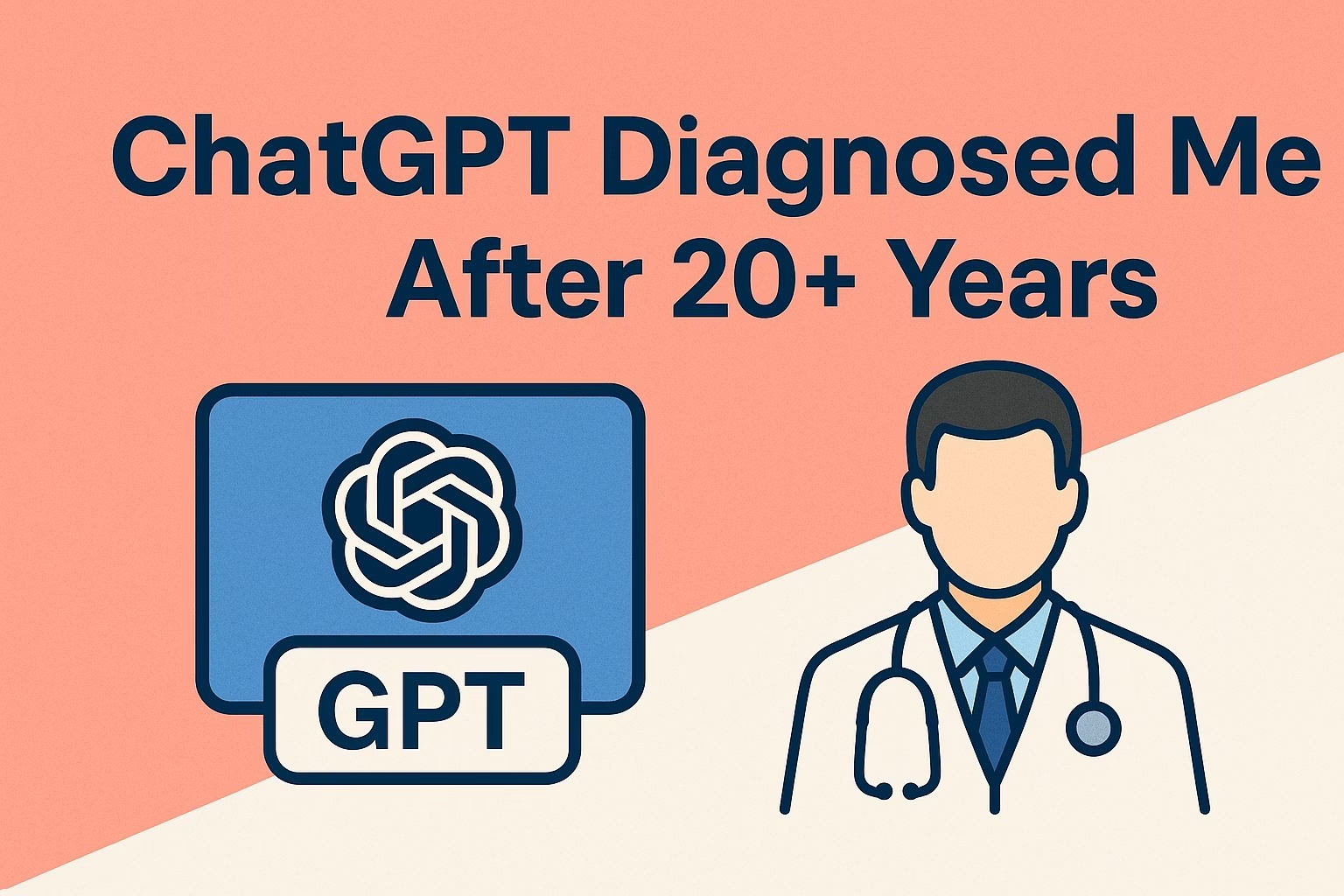ChatGPT Diagnosed Me After 20 Years of Misdiagnosis
Key Takeaways:
1. ChatGPT has helped some users identify overlooked medical conditions.
2. AI works best as a second opinion, not a replacement for real doctors.
3. Responsible use requires medical confirmation and careful interpretation.
Most people wouldn’t expect an AI chatbot to outperform medical specialists, yet that’s what one Reddit user claims happened after decades of failed diagnoses.
Their post, titled “ChatGPT diagnosed me after 20+ years,” quickly drew attention from both skeptics and supporters who debated whether AI can really outperform doctors in spotting medical patterns that humans miss.
The user said they had seen multiple doctors, undergone expensive hospital tests, and were still left with no answers.
Frustrated, they turned to ChatGPT and fed it their symptoms, medications, and blood results. The model returned a ranked list of possible causes, with reasoning for each and the easiest ways to confirm them.
After testing the top few, the user found one that matched perfectly. When their doctor prescribed a harmless medication to test the theory, the symptoms vanished within two days.
That single moment triggered a massive discussion about how AI is starting to fill the gaps left by overwhelmed healthcare systems.
Can AI Really Diagnose Medical Conditions?
The story sparked a debate across Reddit, with reactions ranging from disbelief to cautious optimism.
Some commenters accused the post of sounding like an advertisement for ChatGPT, while others shared similar experiences.
One user explained how ChatGPT helped identify that their blurred vision was a side effect of a prescribed drug. Another said it guided them toward a hearing condition that required urgent treatment, which saved them from permanent damage.
These experiences highlight a growing trend. People are starting to use AI tools not as replacements for doctors but as second opinions when medical visits fail to provide clarity.
ChatGPT doesn’t perform medical tests or issue prescriptions, but it can cross-reference symptoms with medical literature at lightning speed.
That makes it useful for spotting connections that a human might miss, especially in complex or rare cases.
Still, professionals warn that such stories can be misleading. AI models don’t “know” medicine; they generate probable suggestions based on data patterns.
Without medical oversight, users risk chasing false leads or overlooking serious conditions that need real testing.
The power lies in how the information is used, not in the AI itself.
Why People Are Turning to AI for Health Answers
The thread also revealed something deeper about the state of modern healthcare.
Many users echoed frustrations with overworked doctors, short appointment times, and dismissive attitudes toward persistent symptoms.
One comment summed it up:
“The one person who cares the most about your health is you.”
In that context, AI becomes a tool for empowerment. It allows people to research, question, and document their symptoms in a structured way before visiting a doctor.
Some even use AI chats to build checklists, review potential medication conflicts, or identify which tests might narrow down possibilities.
For those in countries with high healthcare costs, like the United States, this can be a financial lifesaver. Running ideas past ChatGPT costs nothing and can save patients from repeated visits or unnecessary procedures.
Yet even supporters agree that AI should never replace qualified medical professionals.
It’s most effective when paired with a cooperative doctor who’s open to exploring new angles.
The Risks of Self-Diagnosing with AI
Not everyone in the Reddit thread was convinced that AI-assisted diagnosis is a good idea.
Some commenters raised concerns about placebo effects, selective reasoning, and the tendency for people to interpret AI results as proof rather than suggestion.
One user pointed out that large language models tend to agree with the user’s assumptions, making it easy to confirm what they already believe instead of challenging it.
This highlights a major risk. Without medical expertise, even the best AI output can be misread. A symptom like fatigue could point to anemia, thyroid problems, depression, or dozens of other causes.
When ChatGPT lists possibilities, users might focus on one that “feels” right and ignore others that require urgent care. In medicine, that kind of confirmation bias can be dangerous.
AI also lacks access to private medical data such as imaging results, pathology reports, and genetic tests. Without that, its suggestions remain surface-level.
Used responsibly, AI can help patients ask better questions. Used recklessly, it can delay treatment or create unnecessary anxiety.
The takeaway from most credible users in the thread was simple:
AI can guide you toward answers, but your doctor still confirms them.
What Stories Like This Say About the Future of Healthcare
Stories like these reflect a shift in how people engage with healthcare. Patients are no longer passive recipients of medical advice.
They are using AI tools to take a more active role in diagnosis and treatment discussions. That doesn’t make doctors less relevant. It changes the relationship into something more collaborative.
In time, hospitals may integrate conversational AI into triage systems or patient intake forms. That could help flag overlooked symptoms earlier and free up doctors for complex cases.
Already, tools like ChatGPT have been used for symptom sorting, medical documentation, and preliminary patient education.
The question isn’t whether AI will play a role in medicine; it already does. The real challenge is defining how to balance machine suggestions with human judgment.
For now, the smartest move is to treat AI as an assistant, not a substitute. When both sides work together, patients stand to benefit most.
Stories like the one shared on Reddit remind us that people want to be heard, and when AI helps them find relief after years of confusion, that alone signals a need for change.

